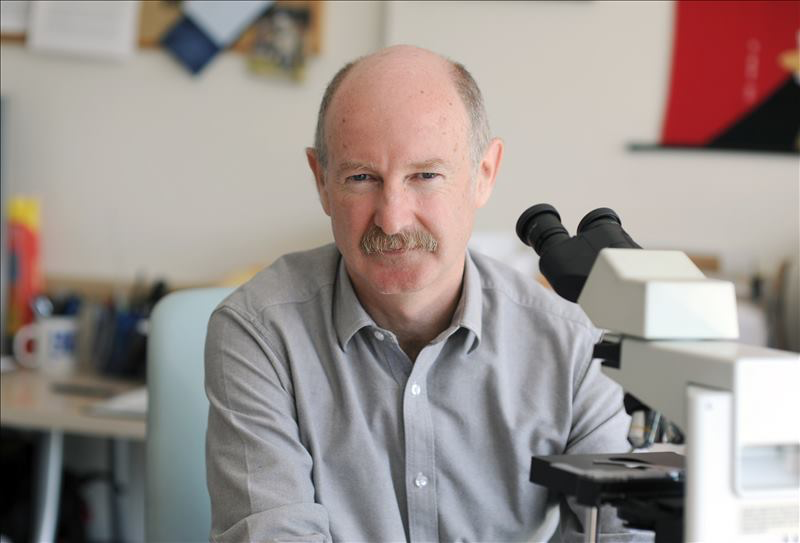NanoNeuro: Hacking neural circuits with nanopipettes and nanoparticles
9th November 2022
Timing : 1 pm EST
Please use this zoom link for joining the webinar
Note: Registration is Required. Register here
For a list of all talks at the NanoBio seminar Series Fall'22, see here
Supported by the NEI (R01EY011787), NSF (2203119) and Vannevar Bush Faculty Award (ONR N000142012828).
1. de Boer W, Hirtz JJ, Capretti A, Gregorkiewicz T, Izquierdo-Serra M, Han S, Dupre C, Shymkiv Y, Yuste R. Neuronal photoactivation through second-harmonic near-infrared absorption by gold nanoparticles. Light Sci Appl. 2018;7:100. doi: 10.1038/s41377-018-0103-0. PubMed PMID: 30534369; PMCID: PMC6279767.
2. Jayant K, Hirtz JJ, Plante IJ, Tsai DM, De Boer WD, Semonche A, Peterka DS, Owen JS, Sahin O, Shepard KL, Yuste R. Targeted intracellular voltage recordings from dendritic spines using quantum- dot-coated nanopipettes. Nat Nanotechnol. 2017;12(4):335-42. doi: 10.1038/nnano.2016.268. PubMed PMID: 27941898.
3. Jayant K, Wenzel M, Bando Y, Hamm JP, Mandriota N, Rabinowitz JH, Plante IJ, Owen JS, Sahin O, Shepard KL, Yuste R. Flexible Nanopipettes for Minimally Invasive Intracellular Electrophysiology In Vivo. Cell Rep. 2019;26(1):266-78 e5. doi: 10.1016/j.celrep.2018.12.019. PubMed PMID: 30605681.
4. Garcia-Etxarri A, Yuste R. Time for NanoNeuro. Nature Methods. 2021;18(11):1287-93. doi: 10.1038/s41592-021-01270-9. PubMed PMID: WOS:000708359800001.
Rafael Yuste
Professor of Biology
Columbia University, New York, USA
Rafael Yuste, M.D., Ph.D, is a neuroscientist that studies the cerebral cortex at Columbia University, where he is Professor of Biological Sciences and Director of the Neurotechnology Center. Yuste obtained his M.D. at the Universidad Autónoma in Madrid. After working in Sydney Brenner's laboratory at the Medical Research Council in Cambridge, UK, he was a Ph.D. student with Larry Katz in Torsten Wiesel’s laboratory at Rockefeller University in New York, and postdoctoral student of David Tank at Bell Laboratories in New Jersey. He joined Columbia in 1996 and is currently director of its Neurotechnology Center and co-director of its Kavli Institute for Brain Circuits. Yuste has pioneered the development of imaging techniques, such as calcium imaging of neuronal circuits, two-photon imaging of spines and circuits, photostimulation using inorganic caged compounds, two-photon optogenetics and holographic microscopy. He led the researchers that proposed the US BRAIN Initiative, and coordinated the launch of the International BRAIN Initiative. He also led the “Morningside” group of 25 researchers and clinicians who proposed novel human rights (“Neurorights”) to protect citizens from neurotechnologies. He has obtained awards for his research from the Mayor of New York City, the Society for Neuroscience and the Director of the U.S. National Institutes of Health and the Tällberg/Eliasson Global Leadership Prize.
Professor of Biology
Columbia University, New York, USA
Rafael Yuste, M.D., Ph.D, is a neuroscientist that studies the cerebral cortex at Columbia University, where he is Professor of Biological Sciences and Director of the Neurotechnology Center. Yuste obtained his M.D. at the Universidad Autónoma in Madrid. After working in Sydney Brenner's laboratory at the Medical Research Council in Cambridge, UK, he was a Ph.D. student with Larry Katz in Torsten Wiesel’s laboratory at Rockefeller University in New York, and postdoctoral student of David Tank at Bell Laboratories in New Jersey. He joined Columbia in 1996 and is currently director of its Neurotechnology Center and co-director of its Kavli Institute for Brain Circuits. Yuste has pioneered the development of imaging techniques, such as calcium imaging of neuronal circuits, two-photon imaging of spines and circuits, photostimulation using inorganic caged compounds, two-photon optogenetics and holographic microscopy. He led the researchers that proposed the US BRAIN Initiative, and coordinated the launch of the International BRAIN Initiative. He also led the “Morningside” group of 25 researchers and clinicians who proposed novel human rights (“Neurorights”) to protect citizens from neurotechnologies. He has obtained awards for his research from the Mayor of New York City, the Society for Neuroscience and the Director of the U.S. National Institutes of Health and the Tällberg/Eliasson Global Leadership Prize.
